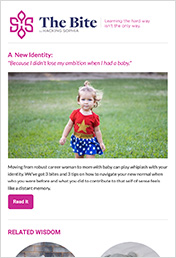One of the greatest things I can teach anyone, is that you don’t need to explicitly teach through reading – it’s not necessarily the most beneficial thing for preschoolers. Rebecca Drory, Speech-Language Pathologist, Founder of Babbling Babies, Mom of 2
Have you ever quit a children’s book mid-page? As working moms it goes against a lot of our natures to not finish a task, and this drive for completion trickles into all aspects of parenting, even in how we read to our kids. But it turns out, you do not have to read stories word for word, front to back to make an impact with preschoolers. What a relief for the exhausted mom just ready to collapse into bed at the end of the day! We sat down with Rebecca Drory, Speech-Language Pathologist, and founder of Babbling Babies, an interactive play and language program for babies and their caregivers, to understand how to make storytime most impactful (with minimal effort!) and hear about her experience as a Cram it all in Year mom.
What To Do (Bites)
-
For the under 5 crowd, think of storytime as a window for meaningful conversations
Rather than reading books word for word or using story time as a teaching or testing moment, aim for story time to provide a rich back and forth dialogue between parent and child. In doing so, you’re actually building what you’re trying to achieve through reading – understanding of vocabulary, concepts, life events and routine-based ideas like what you do at the doctor’s office or the birth of a baby sibling. Being actively involved with you in a chat and taking turns talking about what’s happening in a book can be more helpful for a child’s school readiness than being a passive recipient of a story’s narrative.
-
Follow your child’s lead
Ditch the pressure to finish the book and let your child lead. Especially in the preschool years, if they want to flip the pages and go back to the pages they love, let them. They’ll get more from it than if you push through to get to the end, which could lead to them losing interest, protesting, asking for a different book and possibly developing a distaste for reading. While it’s easy to mindlessly stick to the story when you’re tired and ready to move on, it can ultimately take more time than simply letting your child lead.
-
Make it fun – that’s what leads to school success
When it comes to reading, remember that enjoyment leads to knowledge rather than knowledge leading to enjoyment. If they’re having fun, they’ll learn. So be playful and make the story come alive through gestures and actions. Pretend to chomp on your kid’s finger when talking about the alligator you see. Bang on the picture of the drum. Sniff the flower and say “mmmm smells so good.” Pause and let the child sniff it. See what they say. Make them want to come back for more.
When it comes to reading, remember that enjoyment leads to knowledge rather than knowledge leading to enjoyment. If they’re having fun, they’ll learn.
Tips
-
When engaging in a book with your little one, limit testing questions and use comments instead. Generally, if you know the answer to your question, don’t ask it. When you ask “is that a fox?” – the only (correct) answer is “yes.” But if you say something like “look at that fox, it’s eating cookies, it must be soooo hungry.” You might get a really cool response from your kid and then have a beautiful conversation about cookies, or about what foxes truly eat. This also takes pressure off of your child to respond in a certain way.
-
I get a lot of weird looks when I say I own zero books about school-based teaching concepts like shapes, numbers and colors. Parents are naturally great at implementing these outside of storytime, so kids will learn them. Find books with more unexpected subjects and use story time to work on ‘tier 2 words’ i.e. go beyond “big” – use ginormous, large, gigantic. A child who only gets basic color input may say, “This rhino is grey. That’s a big elephant.” One who has the ability to use longer complex sentences because they are exposed to a greater variety of vocabulary could say: “Oh look, there’s a large rhino and an even larger elephant. But over there, that hippo is gigantic.”
Rebecca shares her thoughts on what to look for when selecting books at each stage here.
-
Go for quality over quantity. Many of us are exhausted by bedtime, so if you only have 2 minutes in you, read for 2 minutes, just make them count. Let them flip through the book and tell you about what they’re looking at. If you’re together, talking and cuddling, that’s what’s important. The only caveat is the book MUST be right side up! Otherwise, there are no rules.
My choices. My wisdom.
Your little one goes to Kindergarten in the fall, do you feel relieved you’re through the thick of the Cram it all in Years?
“The fact that I’m at the end of preschooler life – I actually don’t feel relieved. Because of my profession and focus on little ones, I was lucky enough that I knew what to expect at each stage. Now I’m going into these older years where I don’t know what they’re supposed to be doing. It’s unchartered territory for me. I was always the one where people came to me and now it’s flipped where I’m reaching out to my school based colleagues with questions.”
How do you balance career and kids?
“I loved my previous job but it wasn’t working for my mom-hood. I went off on my own so I could spend more time with my kids. Now I’m even busier than before, which sort of defeats the purpose of why I went into private practice to begin with. With two sides of my business to run – both my private speech therapy and with Babbling Babies, I’ve created a monster, so I have had to create rules for myself to follow. My kids throw my phone in the basement during dinner because if I get a client email, I feel the need to answer it immediately and will ignore my own kids. Working for myself and being my own boss does allow me to have complete power over my schedule which makes it all worth it for me.”
What does your career do for you that you’d miss if you didn’t have it?
Since this pandemic, my practice has greatly decreased and it feels like there’s a part of my soul that’s missing. If I wasn’t a speech pathologist, I wouldn’t want to be anything else. I love working with kids and seeing their language improve but I really like helping parents, because they are the ones who can make the biggest impact on their kid’s development – if I can help one parent change one little thing, it’s everything to me. Right now it feels like I’m not able to help others like I was before. It’s why I’m so excited about this conversation – I feel like I’m helping by sharing my knowledge.
Have you developed any bad habits since becoming a working mom?
“My husband makes fun of me that I often do the opposite of what I teach my clients. I’m telling my families to engage in play with their kids and then I find myself on the couch answering emails while my kids play. I’m trying to be better at practicing what I preach.”
When your kids become adults what’s the one thing you want them to say about you?
“That they see me doing something that I love. That it isn’t about the paycheck or title of the profession or how well known I am, it’s that I’m excited to wake up every morning to do what I love to do.”
What do you think the rest of the world doesn’t understand about being a working mom?
“You’re never shutting off. You are always on for someone – either for your kids, work, spouse or for yourself. You have to mentally take care of all components. When I was in my 20s, I went for a manicure, planned a vacation or applied for a job without considering anyone else. As a mom you’re constantly thinking of all these variables. When I booked this interview, I had to think about where my kids would be, when my husband could watch them, what client work I may need to work around, and when I am going to shower. It’s so multifaceted.
Photo: Scarlett O’Neill






